Of Course That’s A Thing
A series of extreme pastimes and what makes them
bizarrely British
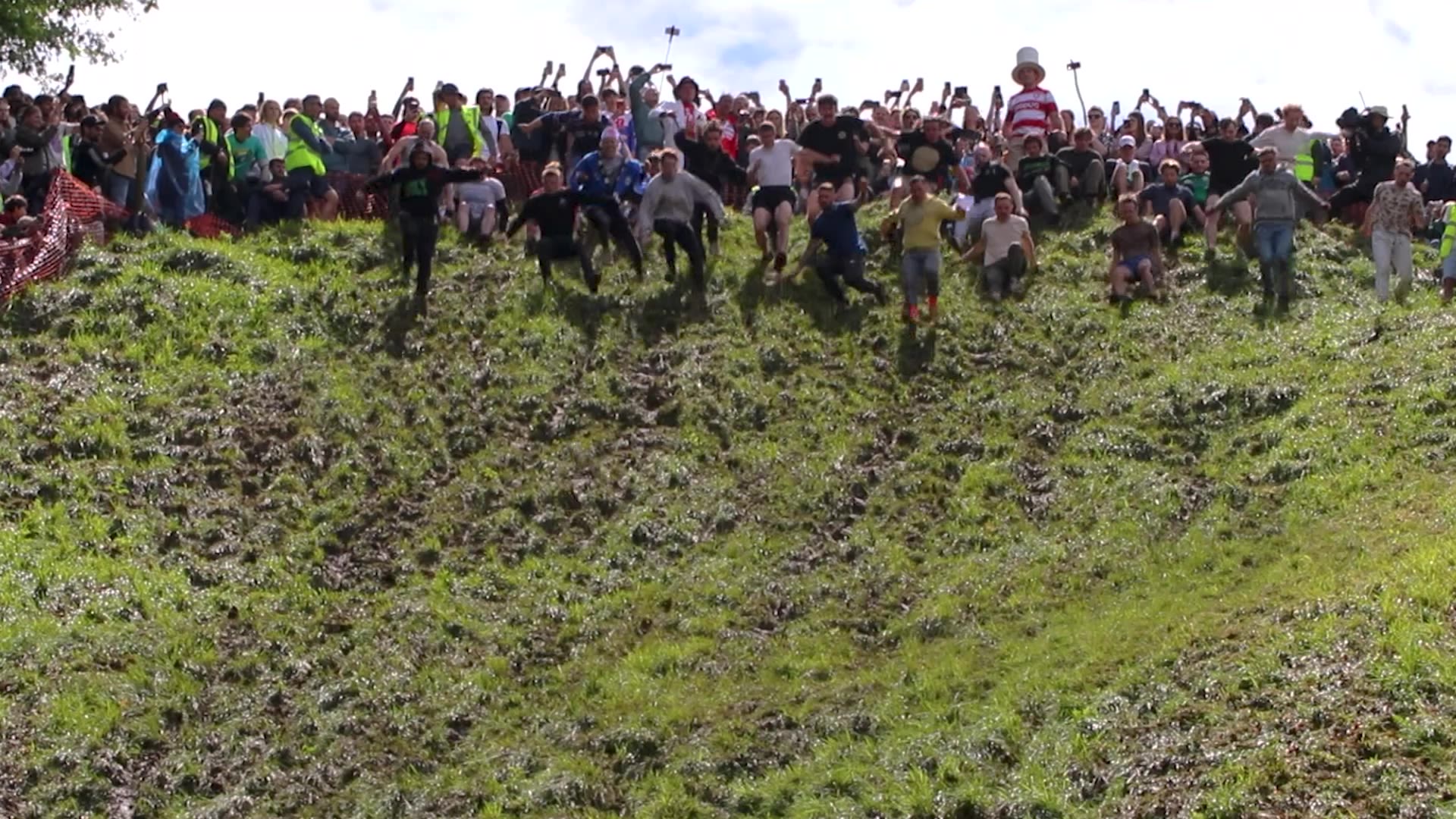
Years ago, leisure games and activities were major indicators of social class. Be it sword fighting at courts or gambling and jigs in taverns and fairs, participatory customs defined one’s cultural palate and universally affected divisions of power. The pastimes have since entered popular culture and evolved into global bucket list activities.
In the context of Great Britain, this shift extends to a list of strange traditions which have stood the test of time. Some are endearingly silly, others downright bizarre. We’re talking about the nation’s eccentric weekends that once attracted the strongest and most eligible bachelors of the English countryside – including the likes of Gloucestershire cheese rolling, Dorset nettle eating and Congham snail racing.
Largely tied to the farming calendar, the three events present a collection of stories about people, places and experiences. But what makes the presence of such offbeat traditions uniquely ‘British’? Is it the pure chaos and carnage that other countries won't dare replicate? Their existence as a rationale to be under the elusive sun? Or perhaps their legendary roots in Britain’s pub culture?
According to Dorset-based author and storyteller Martin Maudsley, the country’s enduring appeal for the weird and wonderful stems from the difficult lives led during medieval times. “There was a real need for people to meet as a community, be flamboyant and do something fun and different when they worked extremely hard for a living,” he says.
Local pastimes were then escapism-fuelled pursuits which celebrated certain activities that weren’t hosted anywhere else in the world.
“It’s notable that many odd sports and competitions were dreamt up in pubs and several ancient customs involve drinking – for which the Brits have been famous for centuries – but there are plenty of others that are more connected with religion. So, it can’t be just that,” says Averil Shepherd, author of online British events guide Calendar Customs.
“And naturally, many of the outdoor events which happen in the UK are in the summer months when we stand a slim chance of warmer weather, but it's not just that either.”
Registering up to 200,000 website visitors a year, Calendar Customs is Shepherd’s labour of love which helps readers understand the rich history of unusual traditions and encourages them to attend and support the events annually. The hobby has also been a source of endless fascination for Shepherd, prompting her to participate in interesting customs and join other enthusiasts in marvelling at their uniqueness.
“I think there’s a certain pride in us keeping weird traditions alive, with a perception that they’re typically British and peculiar,” she says. “People enjoy feeling like they’re a part of something special. I know I do.”
The urge to protect events which have come to reflect specific habitats then reinforces identity and establishes gateways into reliving the past, as per Maudsley, who has authored Telling The Seasons – a record of British customs and folklore around the year.
“Once it becomes a local tradition, people of the area take the responsibility to continue its legacy. They don’t want to be the ones that let it go,” he adds.
Locations and details of the events across Britain. Interactive map by Malavika Pradeep
While the unofficial organisers of the Gloucestershire cheese rolling races are committed to keeping the tradition alive, despite knocking out grandmothers in the process, Dorset nettle eating and Congham snail racing championships continue to offer mud-bathed, family-friendly shenanigans.
Once criticised for their proliferation of disorder and idleness, these social rituals comprise tales of endurance, drive and mastery. Their trials and tribulations need to be heard. And, most importantly, passed on to the next generation.
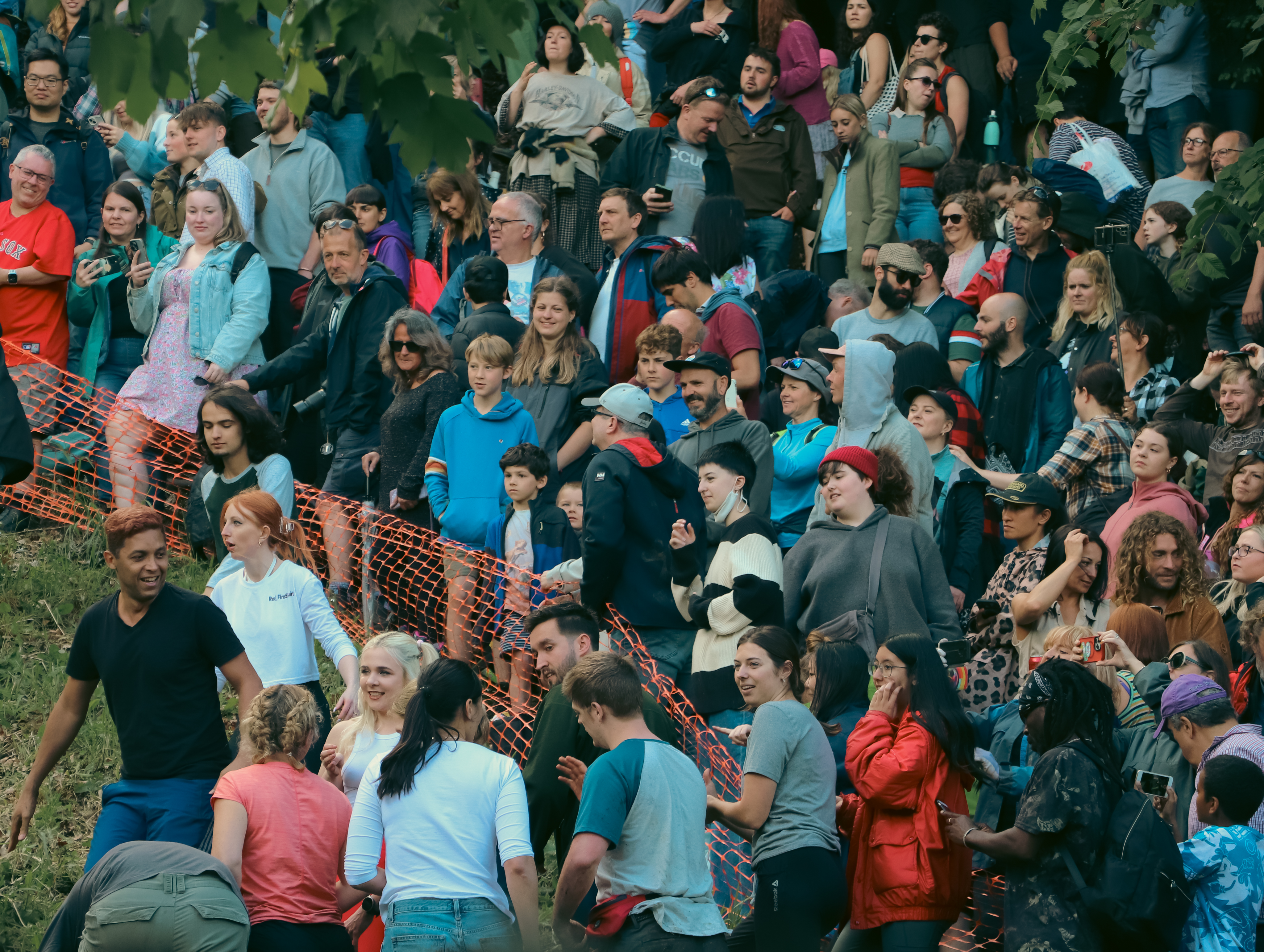

Cheese, Chase and Concussions
Cheese rolling races at Cooper’s Hill, Gloucestershire
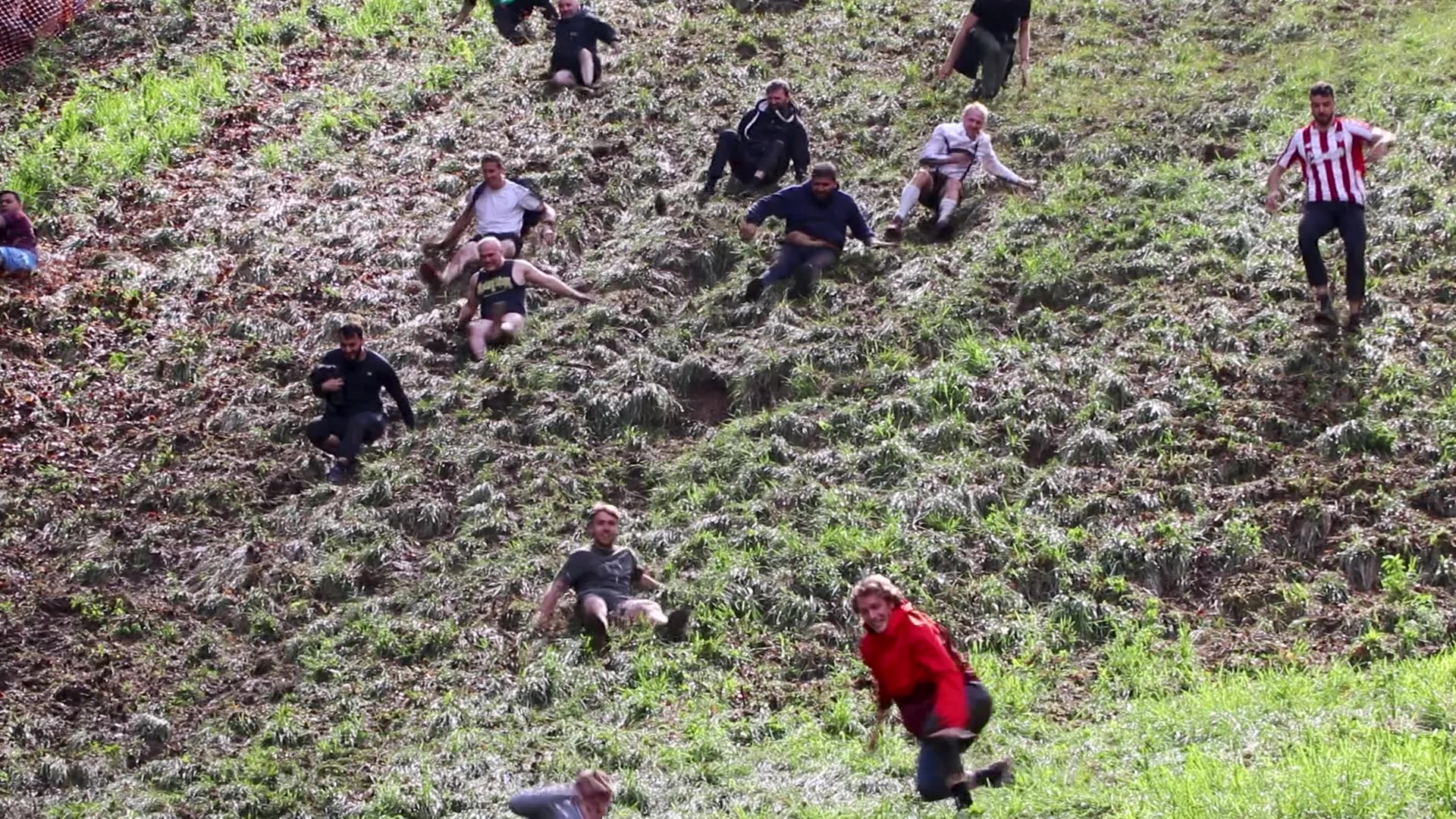
In a peaceful woodland near Gloucestershire stands a testament to human resilience. On paper, Cooper’s Hill is one of Southwest England’s grassiest slopes at 180 metres tall and is often described as the “perfect spot to get away from the cares of modern life.” In person, however, the hill can almost be rebranded as a cliff with a 70-degree, ambulance-summoning incline.
But it is this very majestic yet menacing slope that hosts an annual Jack and Jill-style health risk – a ceremony officially known as Cooper’s Hill Cheese Rolling and Wake.
The format of the event is straightforward. Every Spring Bank Holiday, or the last Monday of May, the Master of Ceremonies rolls a seven-to-nine-pound wheel of Double Gloucester cheese down Cooper’s Hill. Waves of participants follow, quite literally hurling themselves off the unstable terrain prompted by varying levels of liquid courage. The first person to reach the bottom of the hill, be it consciously or unconsciously, wins the wheel of cheese.

Cooper's Hill in all her ambulance-summoning glory. Image by Malavika Pradeep
Cooper's Hill in all her ambulance-summoning glory. Image by Malavika Pradeep
Although the first written evidence of the tradition has been traced back to 1826, some locals claim cheese rolling was mentioned in the Domesday Book of 1086. It is also believed to pre-date the Phoenicians, Romans and Ancient Britons. The acts of scattering and rolling symbolic objects down the hill are further reputed as a pagan ritual encouraging fertility and embracing the New Year following winter.
Despite its uncertain origins, modern-day cheese rolling is widely accepted as a bucket list activity and trolled online as an outdoor IQ test.
“It’s quite an eccentric event which is also really hardcore and probably a little crazy,” says Chris ‘King of the Hill’ Anderson, a British Army veteran who won his first race in 2005 when he was 17 years old. Hailing from a village at the foot of Cooper’s Hill, Anderson admits to watching the ceremony for several years before participating.
The event is divided into four downhill races – three for men and one for women – with a maximum of 25 players each. Uphill events are additionally hosted for children and young adults. Participants are also free to enter multiple races in a single year. Anderson thereby holds the current world record for winning 23 cheese rolling races over a period of 14 years.
“It’s majorly the adrenaline rush that motivates me and I also aim to win when I race,” the 36-year-old says, having won all three men’s segments in 2011 and 2017.
However, a well-researched strategy seems imperative for players looking to snag the title. Previous participants have tried everything from strength training and rapid bum shuffling to even competing barefoot to maintain their agility and aerodynamics.
Anderson’s winning tactic involves racing on his feet for at least 20 metres before letting the hill take the reins of his fate. “You have a good chance of winning the races if you’ve got good balance and centre of gravity,” he adds.
According to two-time women’s winner Abby Lampe, the trick to secure the wheel of cheese is to become one. “I just remember rolling down and my face getting beat up,” she says. “I was thinking to myself [that] I would get to the bottom at some point, and it will be over.” Meanwhile, Munich-based 2024 winner Tom Kopke shares that he slid his way downhill to success.
“Everyone said rolling is the best strategy but I just football slid and got back on my feet as quickly as possible,” the 22-year-old recalls.
In essence, cheese rolling demands the inhuman combination of athleticism, good understanding of physics, mild luck and immense love for dairy.
Excerpts from Cheese Rolling 2024. Video and editing by Malavika Pradeep
What makes participants’ achievements noteworthy is the injury rate associated with the voluntary pursuit of cheese. In the past, emergency services and disaster response teams have tended to faceplants, torn muscles, dislocated shoulders, broken thighbones and concussions.
Baffled spectators are not exempt from health and safety risks either. In 1990, a 59-year-old grandmother was reportedly knocked out by a wheel of cheese as it essentially transforms into an edible projectile – travelling up to 80 miles per hour – when rolled down a steep hill. Lightning strikes have also been a plausible threat in the past alongside lethal cheese slaps for onlookers.
But the tradition has never recorded a fatality since its inception. In fact, there have been more deaths by cheese stored on shelves than those logged at the cheese rolling races. “I’ve seen a couple of snapped legs,” Anderson admits. “But the worst is probably bruised kidneys that I’ve suffered from.”
Nevertheless, police and council members foreshadowed a cheese rolling ban in 1998 by stating the safety, insurance and sobriety concerns of participants. Organisers of the event then went on to accuse authorities of building a “nanny state” where citizens are discouraged from embarking on “robust country pursuits.”
The tradition’s conflicting relationship with officials took a turn for the worse in 2009 when 15,000 enthusiasts attended the event on a hill with a capacity of only 5,000 people. The organising committee later turned to blatant commercialism as the one-stop solution for crowd control issues.
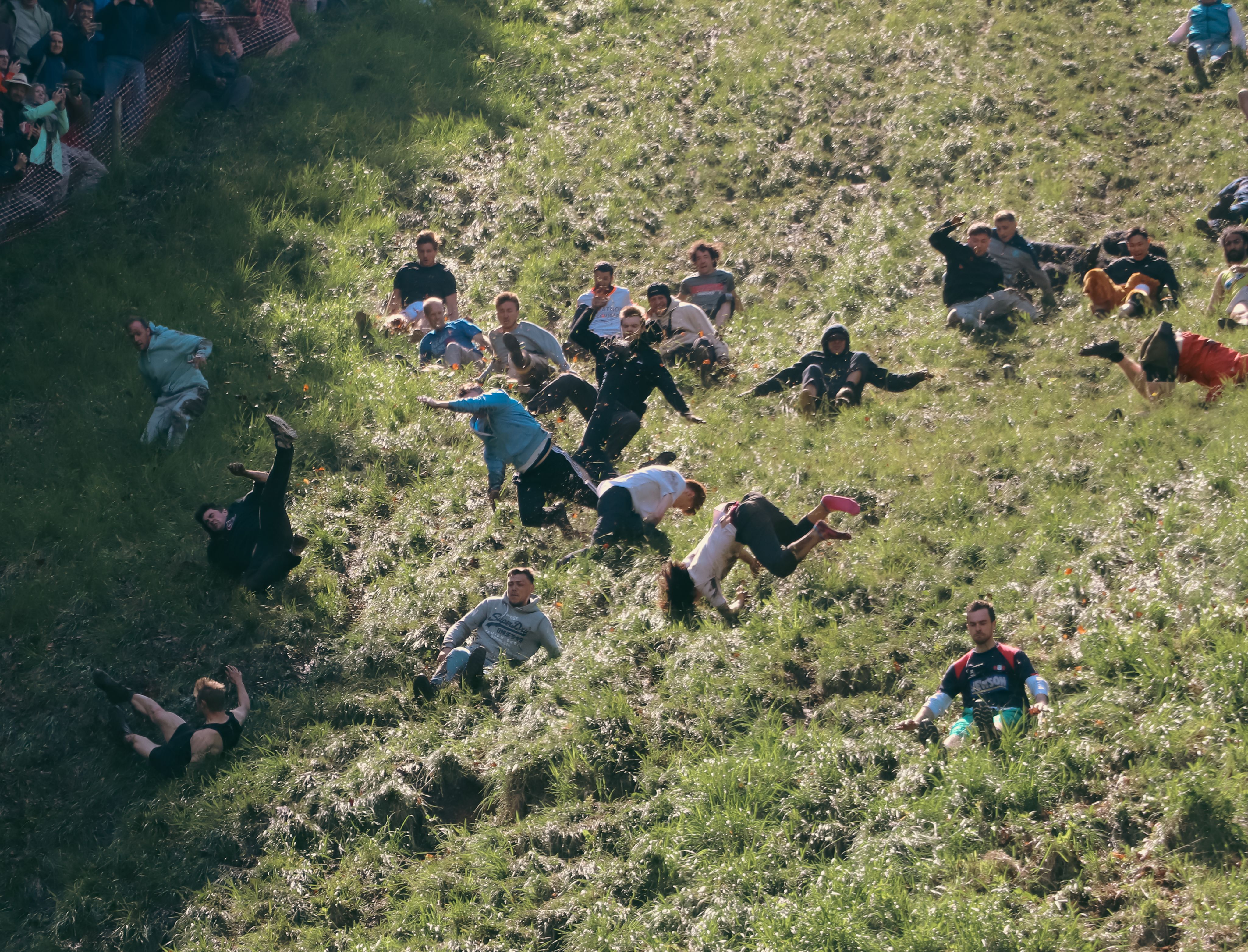
“They tried to put a price tag on the event in 2011,” Anderson says. “They wanted to charge £20 per ticket and hold it over a whole weekend but the locals quickly put an end to it because cheese rolling has always been free for everyone to take part and attend.” Though the races were eventually banned in 2012, they continue to be hosted unofficially with added health and safety measures.
“It's not a professionally organised event where you would have insurance and all that,” Anderson says. “It’s put on by local volunteers who have sort of kept quiet of who they are so everyone knows what they are getting themselves into when they turn up to the cheese roll.”
Every banner and Facebook post regarding the tradition is essentially fronted by warnings to curb double fractures in the pursuit of Double Gloucester.
Although the event’s ‘unofficial’ status implies the absence of police and ambulances on the site, volunteer paramedics and tents are placed at the foot of the hill for urgent care. “There are two hospitals that are the same distance apart from the hill, one in Cheltenham and one in Gloucester. So, if there are any injuries, they are taken down to the local village and picked up from there,” Anderson says.

“There are broken bones and concussions every year. If you are lucky, you might just get away with cuts and bruises”
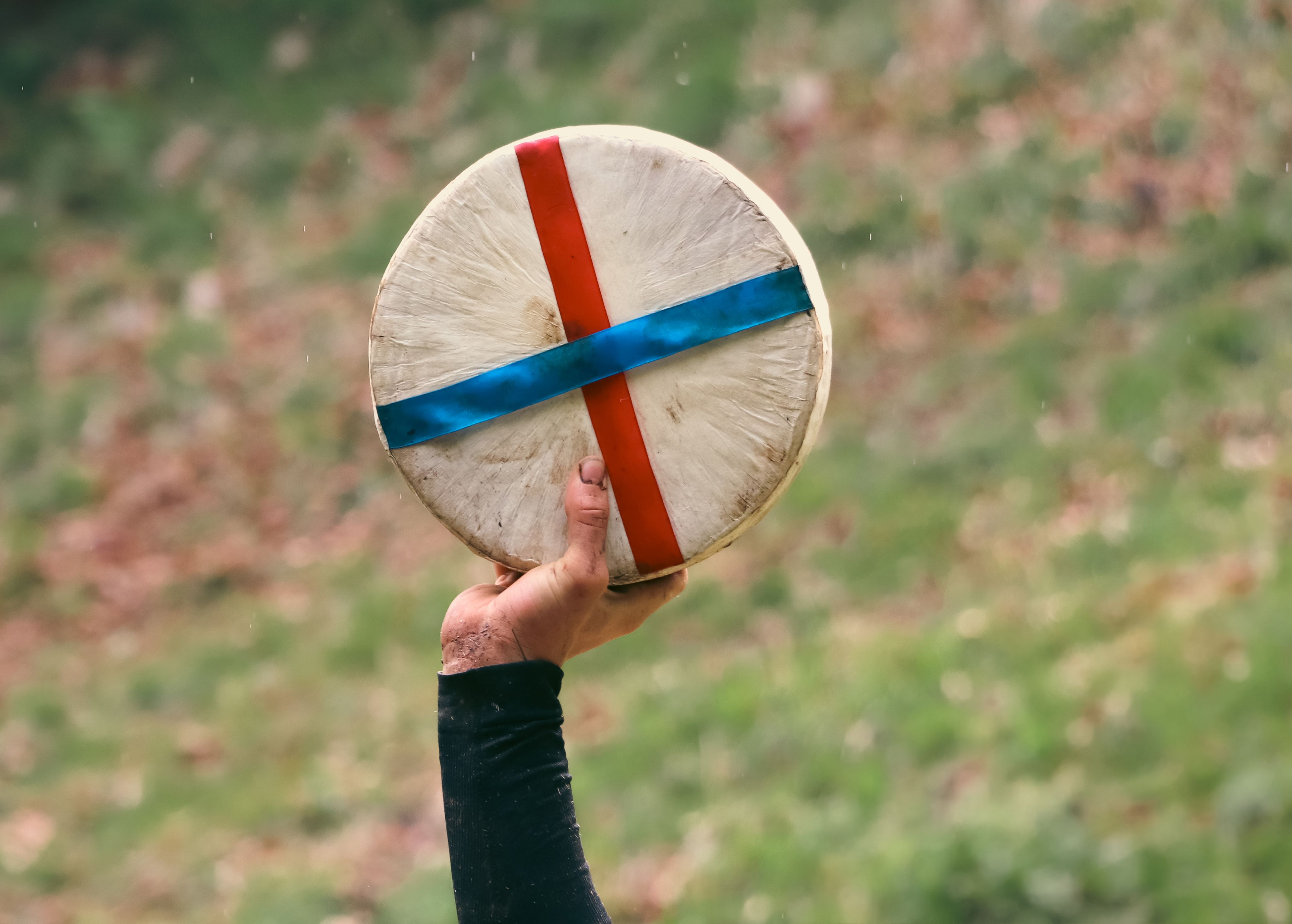
Written excerpts from the early 1900s highlight how players had to survive the hill and run into a hedge at the bottom to break their fall. The event has since substituted shrubs with the local rugby team as the first line of defence. Dubbed ‘The Badgers’, the team tackles participants for their wider safety as they hurtle down to the foot of the hill.
The sight is arguably more gripping, although dangerous, than the races themselves.
“A couple of rugby players have been injured, considering people come down at maybe 20 to 30 miles per hour,” Anderson says, adding that a team member once cut his eye open after tackling the same participant as his colleague. “But if they don’t stop them there then they’re headed straight for the hedge, which is riskier.”
At its core, cheese rolling is all about the chase for a disc of Double Gloucester wrapped in painter’s tape and topped with iconic ribbons. While some equate the wheel of cheese to the elusive and intense sun in British summers, Anderson believes that it embodies the true spirit of Gloucestershire. “Britain has a lot of crazy events and I think the cheese has made this one a bit more ‘British’ and quirkier,” he says.
Apart from the coveted cheese, the event also bestows winners with a drive to guard their titles. “Once you start there's no going back,” German winner Kopke says, pledging to return in 2025. “I found [out] about cheese rolling years ago on the internet and I wanted to defend my title in 2024,” women’s winner Lampe shares, having snagged her first wheel of cheese in 2022.
Anderson, on the other hand, admits to being “semi-retired” from the chaos and carnage. “I probably will run again soon,” he adds.
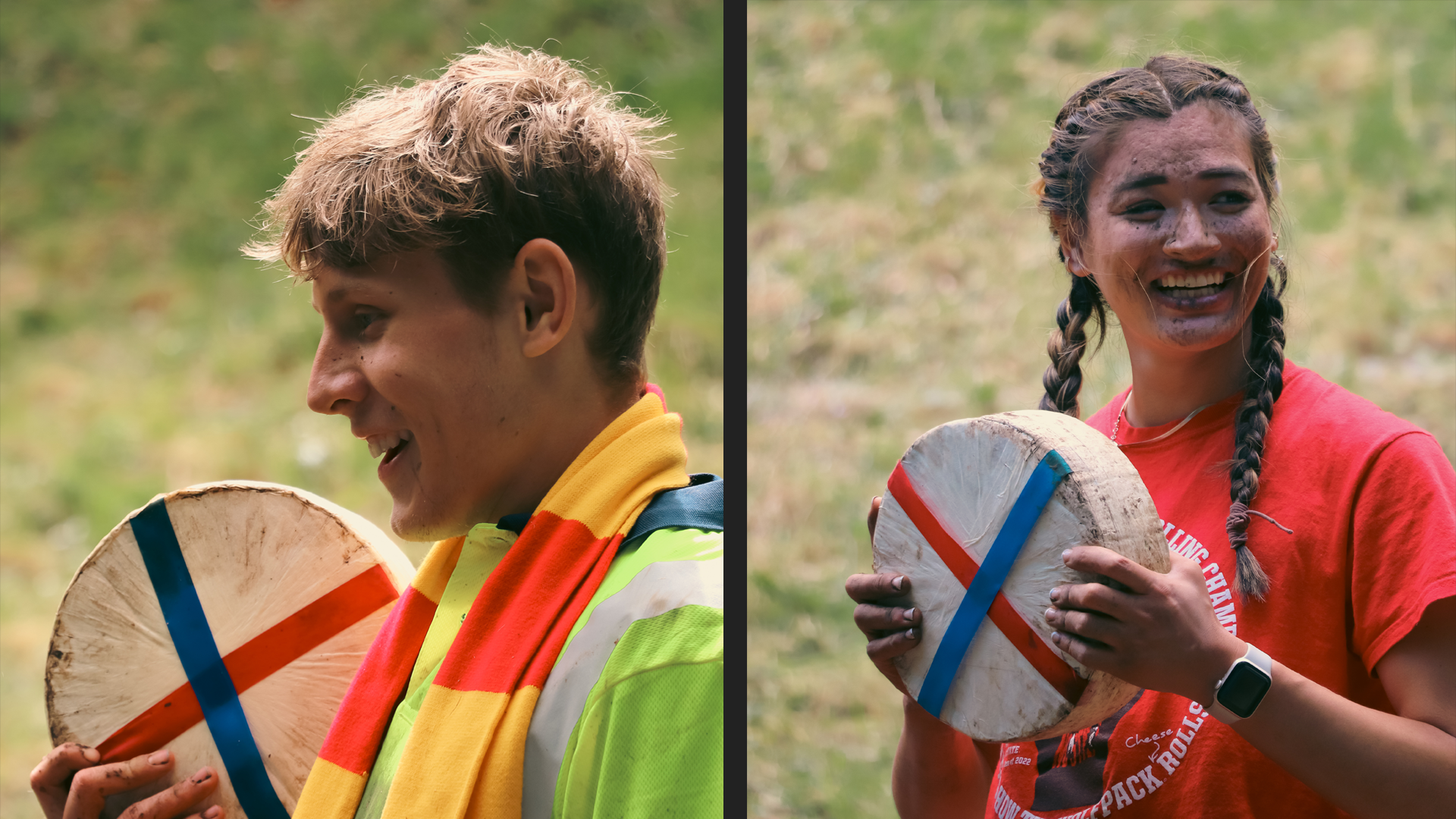
Tom Kopke (left) and Abby Lampe (right) with their wheels of Double Gloucester. Images by Malavika Pradeep
Tom Kopke (left) and Abby Lampe (right) with their wheels of Double Gloucester. Images by Malavika Pradeep
“Know what you are getting into but if you are going to race, race to win”
The Spring Bank Holiday shenanigans – held on a big hill in a small town with moderate injuries – have not only gained global significance but also evolved into a noteworthy stance against the commodification of culture. Anderson also doesn’t visualise the tradition becoming any bigger than it is today. “It will always run the same way it has been running all these years,” the cheese rolling veteran says.
But in an economy where cheese literally costs an arm and a leg, many wouldn’t be surprised if the Double Gloucesters were eventually replaced with symbolic Babybels.
Nausea, Nutrition and Numbness
Nettle eating contest at Bridport, Dorset
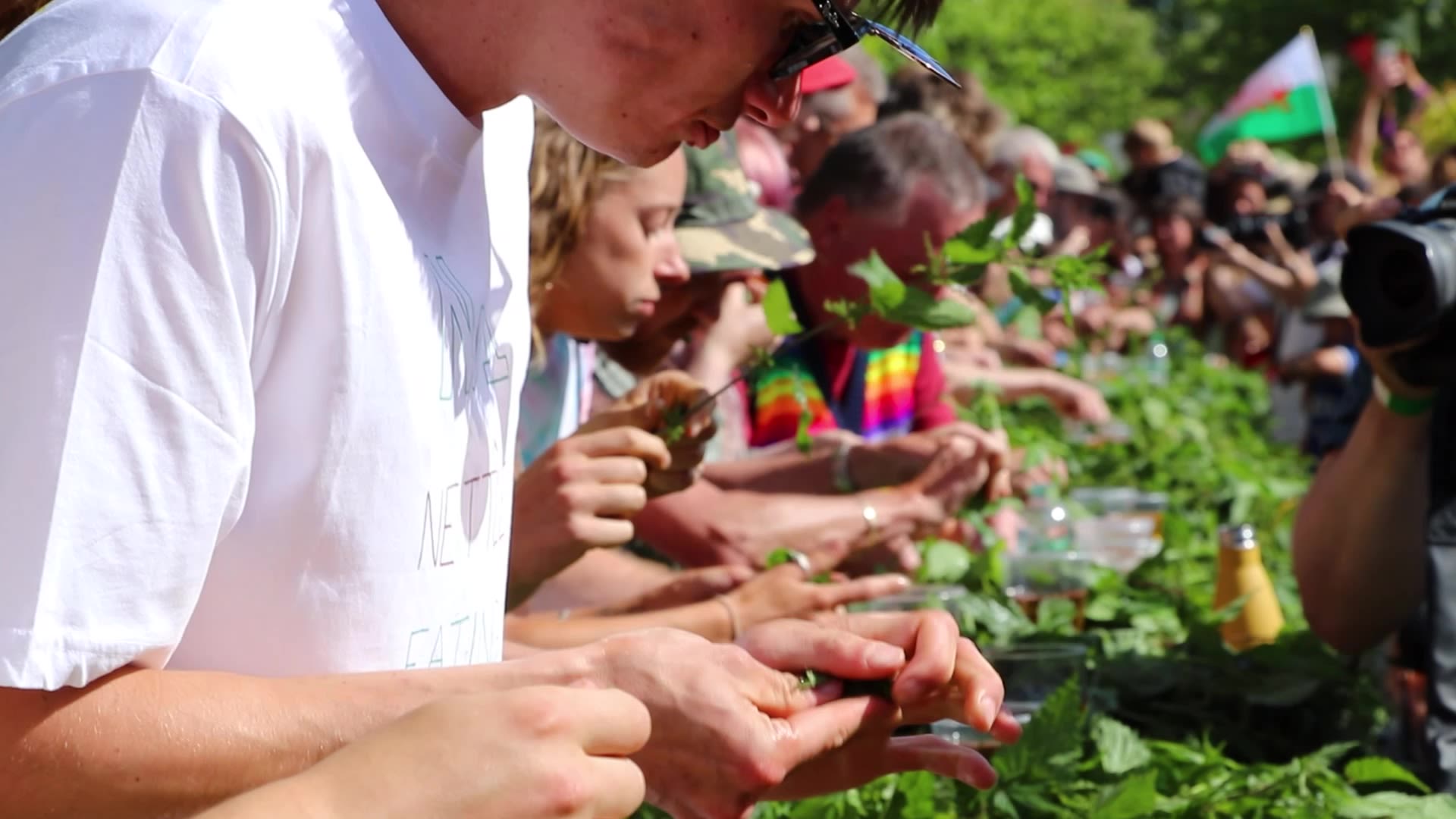
During Julius Caesar’s invasion of Celtic Britain, it is alleged that Roman soldiers used to lash themselves with a stinging plant to increase blood flow and shield against extreme winters. Having sown the seeds in large swathes, the plant would then go on to become the bane of humanity’s outdoor existence.
As a child, you may have been heavily warned and conditioned to shun the spoilsport weed, which injects a cocktail of chemicals into the skin upon contact. You then pretty much forget about the plant as you age until you are left nursing itches after a mental health stroll in Richmond Park.
However, in the late 1980s, locals in West Dorset, England, accidentally kicked off a tradition – that upstaged the Romans and continues to redefine the invasive plant – by eating its raw stinging leaves, competitively.
Welcome to the World Nettle Eating Contest, an annual celebration of a misunderstood plant that tests the gag reflex of participants and onlookers alike to discern the king and queen of the stingers.
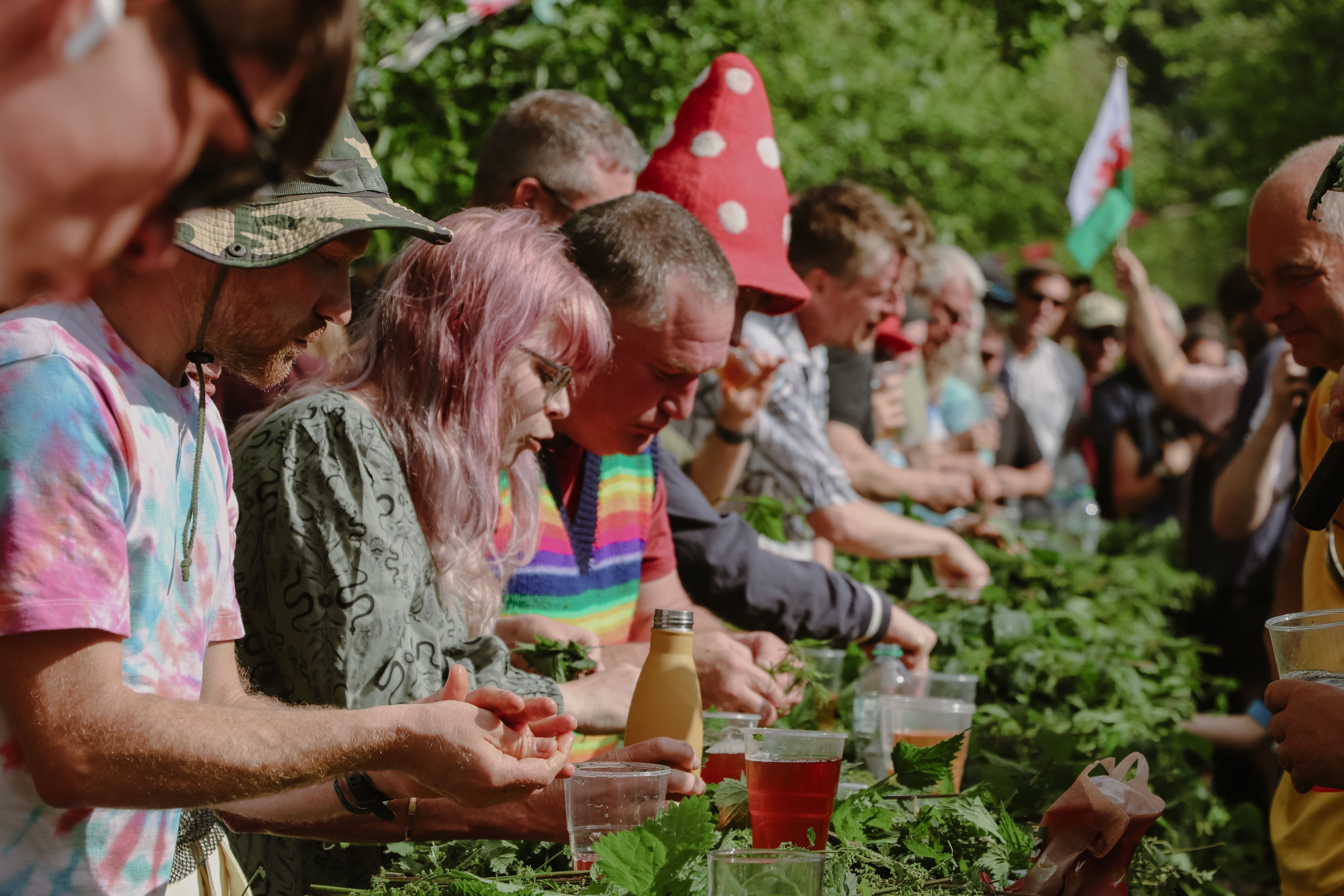
Nettle Eating Contest 2024 hosted at Dorset Nectar Cider. Image by Malavika Pradeep
Nettle Eating Contest 2024 hosted at Dorset Nectar Cider. Image by Malavika Pradeep
The contest unsurprisingly stems from a buzzed bet between two farmers over who had the longest stinging nettles infesting their slurry pits. Gathered at the Bottle Inn, a 16th century pub in Marshwood, the argument grew quite heated to a point where one of the farmers vowed to eat any nettles that were longer than his 15-foot stalks.
Over time, the vocational pastime is said to have gathered immense local interest, which led the Bottle Inn to officiate the tradition in the years since 1997.
The rules of the modern Nettle Eating Contest are questionably detailed. Participants can only binge on two-foot-long stalks of freshly picked, Dorset-born and bred stinging nettles provided by the organisers. Gloves, painkillers and mouth-numbing agents are also strictly prohibited, while liberal amounts of beer and cider are circulated as lubricants.
Perhaps most crucially, players are required to gorge their way to glory without displaying any signs of gastric rebellion. Simply put, bathroom breaks or oral expulsions would result in automatic disqualification.
“We cut everything exactly to two feet so that we know the total feet of nettles each participant consumes,” says Ryan Strong, partner at Dorset Nectar Cider, which currently hosts the contest on its Bridport farm following the 2020 closure of the Bottle Inn. “It’s very important to take this into consideration, especially when there has been a tie and we’re required to do a speedrun.”
The mandate also ensures a uniform chlorophyll feast for all participants and rules out the possibility of people smuggling low-toxic varieties of nettles onto their plates. “We haven’t had instances of anyone cheating but we take quite a strict view to it all,” Strong adds.
Excerpts from Nettle Eating Contest 2024. Video and editing by Malavika Pradeep
Until 2020, participants were given an hour to pluck and eat as many stinging nettle leaves as possible before their bare stalks were measured to crown the champions. The time was reduced to 30 minutes when Dorset Nectar Cider took up the reins – presently organising the annual event on the last Saturday of June.
“The major problem when the event ran for an hour was chewing because your jaw muscles would hurt,” Strong says. The sensation is arguably more overwhelming when paired with swollen tongues, blackened teeth and audible gastric noises.
With the revised time limit, competitors can focus on implementing a strategy that reduces their direct exposure to the ruthless spikes lining the plant.
“One of the tricks of the trade is to grab the leaves from the underneath to avoid the spines and hairs that are stinging you,” Strong says. The jagged leaves are then rolled firmly with the needles facing inwards and placed between the back molars to grind and neutralise the irritants. “Dipping them in cider or beer also helps reduce some of the sting,” Strong continues.
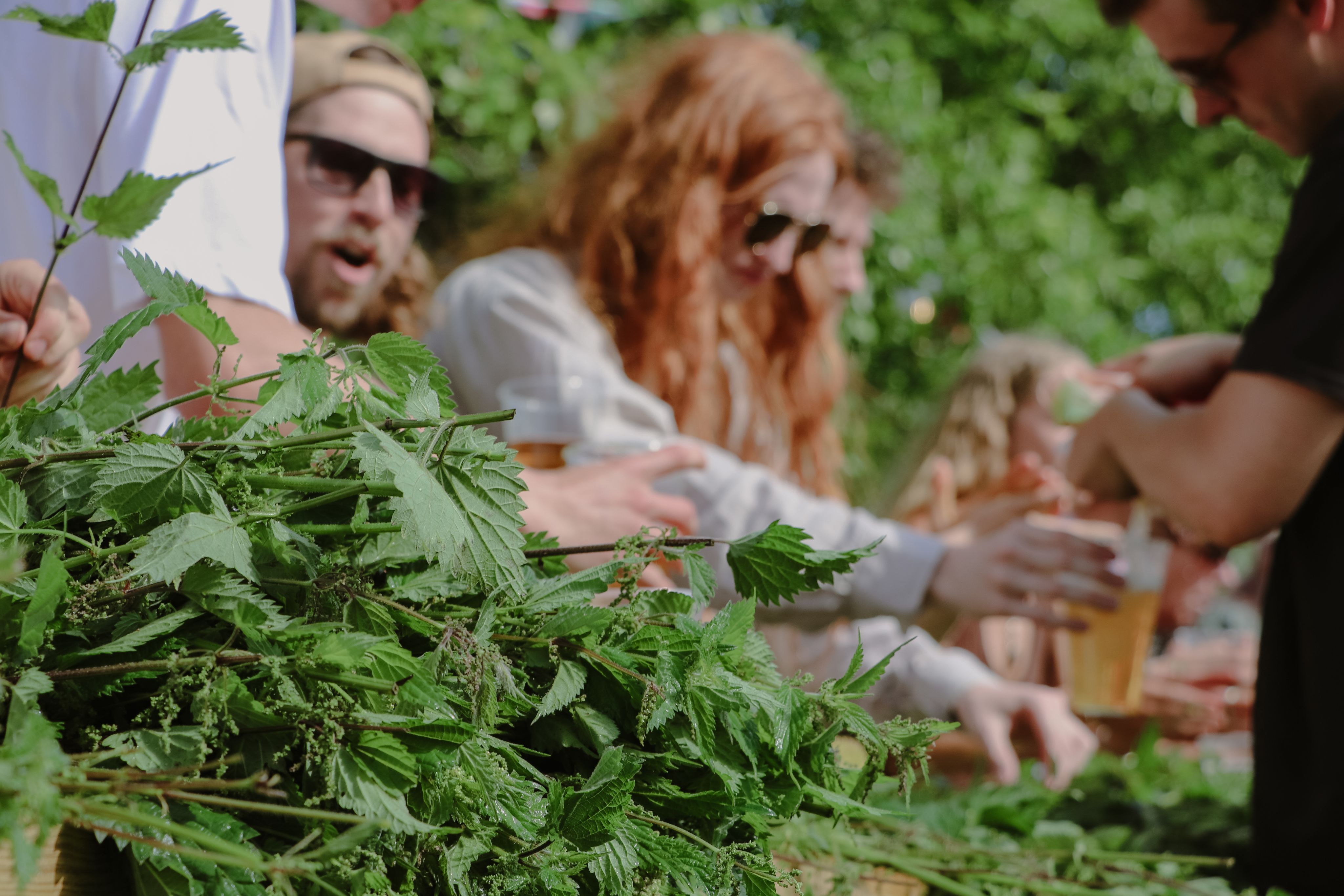
Liberal amounts of beer and cider are circulated as lubricants. Image by Malavika Pradeep
Liberal amounts of beer and cider are circulated as lubricants. Image by Malavika Pradeep
At the same time, it seems essential for participants to be mindful of their stomach elasticity and avoid biting off more than their swollen lips can chew. For London National Park City Ranger and 2023 men’s participant Mike, the secret to walking away seemingly unscathed from the contest was to pace himself and achieve the right balance between nettles and cider.
“I was in the zone for the first 10 minutes of the half-hour contest, enjoying the moreish flavour of the underrated leaves washed down with the farm's own cider,” he says.
“If I’d kept up that pace, I would’ve had a chance. But halfway through, I hit a wall and my body started rejecting the nettley goodness. My stomach simply couldn’t take that volume of nettles, unlike the champion nettle noshers who have guts made from steel.”
Although Mike agrees that it’s possible to train for the competition, he highlights how victory often hinges on a range of external factors – including the techniques of other participants. Weather conditions and the subsequent fertility of the soil also determine the palatable quality of nettles.
“The leaves are soggier to chew and digest when there has been rain in the year during harvest time,” Strong explains.
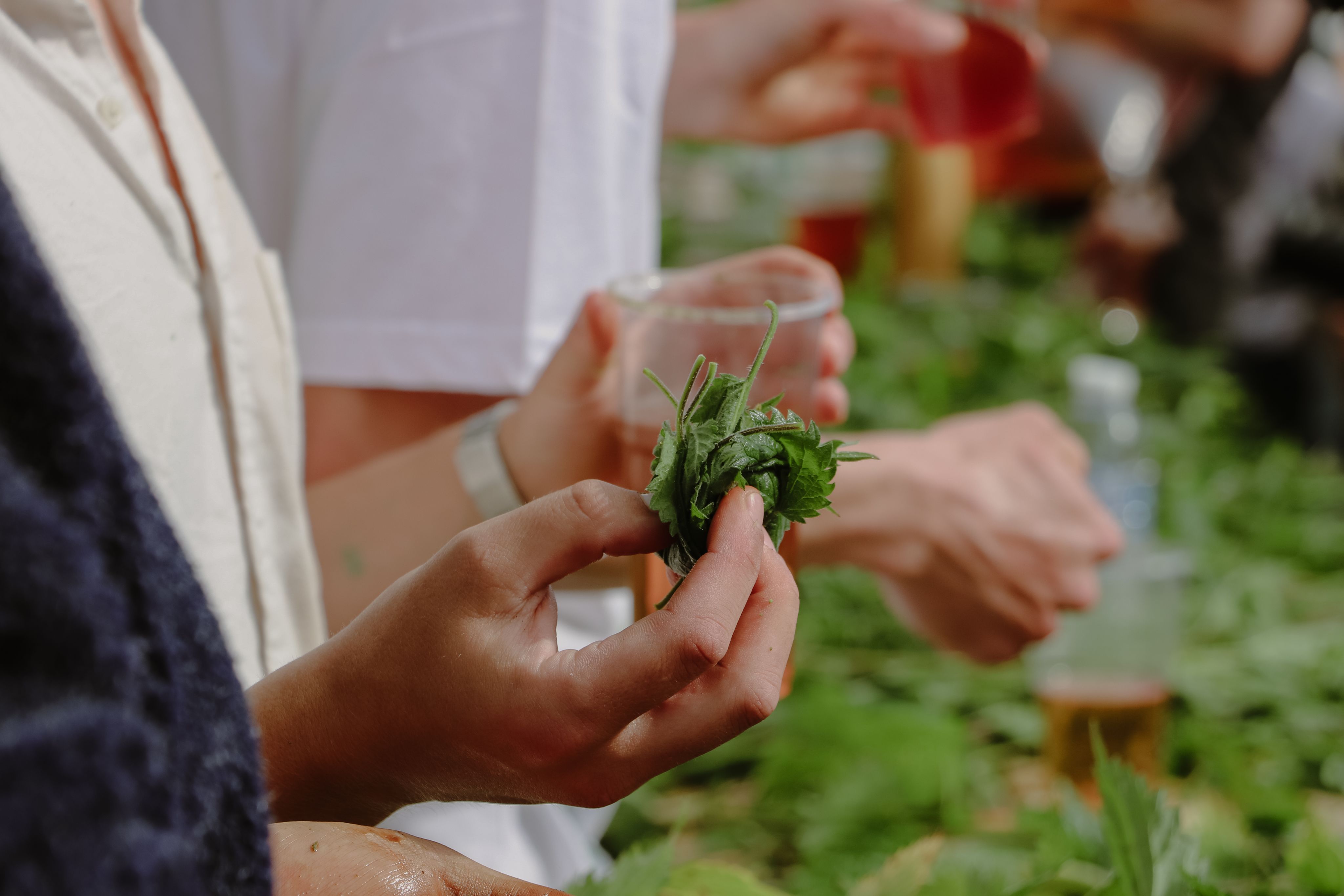
“It’s a mind-over-matter challenge rather than a stuff-your-mouth challenge”

During the contest, participants have described the taste of raw nettles with cider as anywhere between “matcha green tea” and “a mixture of spinach and cow pat.” Despite its conflicting culinary reception, Mike agrees that the bar meal is “a chlorophyll explosion for your tastebuds.” But the expert, who has also founded the London Fungus Network, doesn’t advocate the timed consumption of the plant.
“I love a nettle as much as the next forager, but I wouldn't recommend anyone to eat them non-stop for 30 minutes,” he says.
While most speed eating competitions are criticised for their celebration of gluttony and promotion of food waste as well as eating disorders, the World Nettle Eating Contest contrarily aims to outsize the British appetite for a versatile weed. The extreme nature of the activity feeds into its broader aim of destigmatising the plant’s defence mechanism and revisiting its existence as a nutritional powerhouse.
“Nettles are an absolute superfood with fibres, vitamins and a bit of iron. That’s why people have been eating and drinking it for millennia,” Strong says.
Apart from the wonder plant’s addition to soups, stews, cakes, pasta, stir fry and tea, its extracts have been used in modern medicine to alleviate a range of health concerns from Alzheimer's and arthritis to anaemia and gingivitis. The plant is further harvested to make paper and natural fibres as a substitute for linen and wool. Nettle cider and India Pale Ale (IPA) are also served at the Dorset Nectar Cider farm during the championship.
“The humble nettle does indeed have an unfortunate reputation. But if we spend a little time getting to know our nettley neighbours, they can provide us with a lifetime of joy and nourishment,” Mike admits.
“The other beauty of nettles is that they don’t cost you anything. So mentally, you’re also releasing endorphins because you know you haven’t spent £15 at a chemist shop,” says local Dorset carpenter and long-time spectator Johnny, whose favourite way of consuming nettles is by incorporating them into salads with poached eggs. “A lot of people don’t know the value of nettles before attending the contest. They just show up for the cider and watch others eat them.”
The event then doubles as the perfect conversation starter about the plant’s debated ‘death or dinner’ properties. “You can say that the competition is to help raise awareness about nettles and how eating them won’t kill you,” Strong adds. “But we do have antihistamines on hand, just in case.”
“To be honest, they don't really sting your mouth. It's more of a tingle that lasts all weekend”
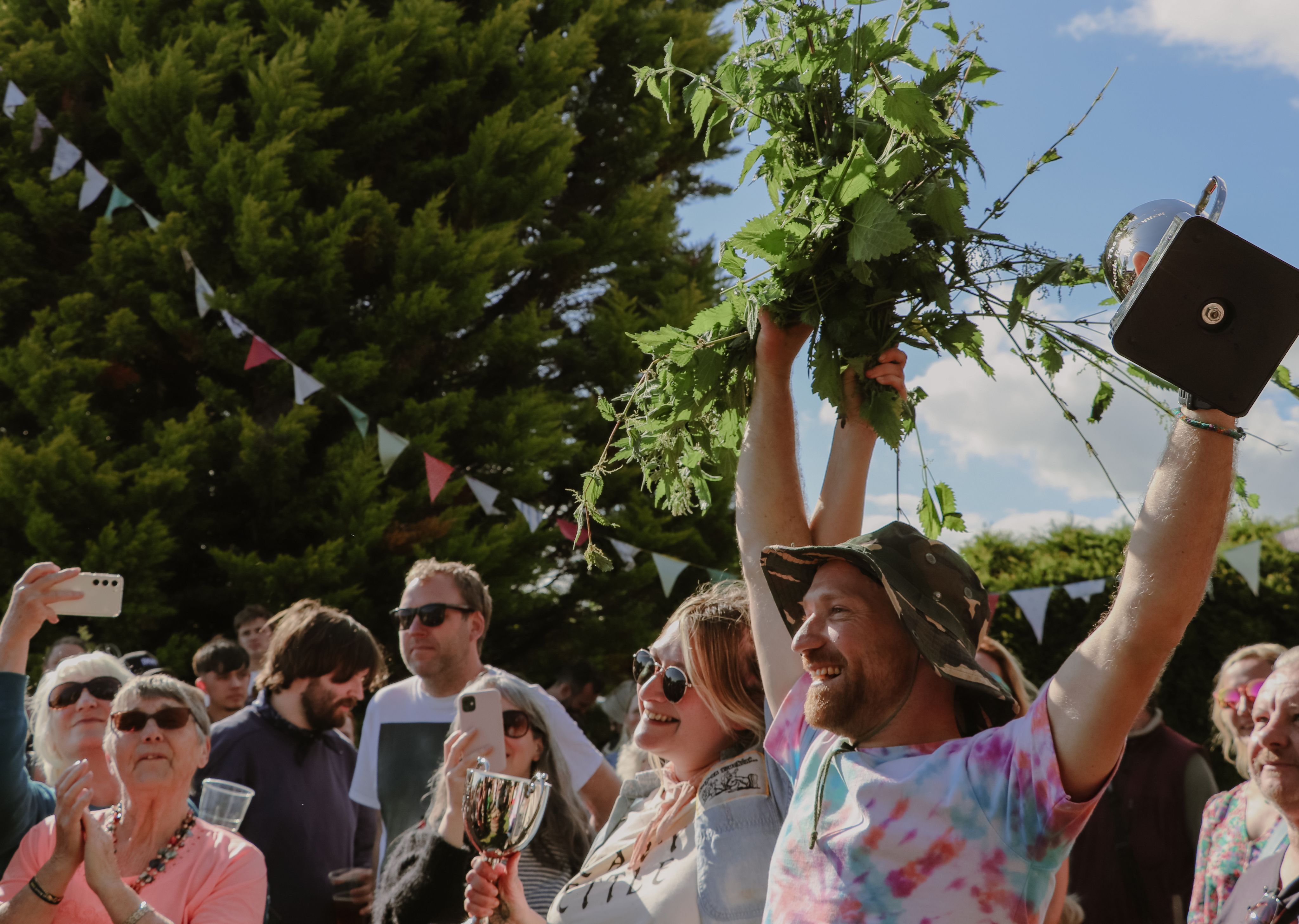
To date, the World Nettle Eating Contest has registered global interest – with competitors and spectators travelling from North America, Australia and Germany for the quirky event. Strong credits the spontaneous nature of the activity for its demand and believes participation is deep-rooted in a “let’s do something outrageous and just have fun with it” philosophy.
“People do it because they want to put ‘eats nettles competitively’ on their CV or dating profiles. Or they participate just for the heck of it,” he says. “Certainly, when I competed back in 2018 at the Bottle Inn, I was like, ‘Well, why not?’”
The event had also been on Mike’s bucket list for ages before his first attempt in 2023. “As a forager, I'd been eating nettles for years, but never in a competitive context,” he shares. “The contest in Dorset is truly a sight to behold. I’d never seen so many nettles in my life. I thought I’d died and gone to nettle heaven.”
The rich history and fear factor of the tradition are also what pushes nettle whisperers like Beth Hodges from South Wales to defend their consecutive titles. Crowned the World Nettle Queen in 2023 and 2024 by ingesting up to 64 feet of raw nettles, Hodges confirms that she will return in 2025 and advises future participants to hydrate themselves while engaging in a blur of munching and swallowing.
Bridport Town Crier John Collingwood kicking off the 2024 contest. Image and audio editing by Malavika Pradeep
Despite the contest having cemented its reputation as a unique Dorset tradition, the closure of the Bottle Inn pub – which is currently a Grade II listed building – threatened the event’s future with a three-year-long hiatus. Strong also mentions how several offbeat events in Southwest England have been discontinued in the years since 2019.
“There used to be kite festivals and garlic clove eating competitions nearby, but all of these have been lost to time and cultural change,” he says. “So back in 2022, I was quite serious about it and convinced the rest of the family that we were going to bring the World Nettle Eating Contest back."
At present, Dorset Nectar Cider is eager to keep the tradition alive and embraces its global demand with an emphasis on practicality. “I don’t want it to become an enormous event because I feel like lots of things can be ruined when they get too big,” Strong says. “There isn’t any contest like this anywhere else in the world and I want it to be kept as authentic as possible.”
There’s evidently more to stinging nettles than what meets the eye, skin or mouth. Although they are destined to be devoured, the plant guarantees survival by gatekeeping itself from nature’s largest predators. Perhaps this evolutionary mechanism could also extend to the lifespan and continued feasibility of the Dorset tradition.
“Nettles have been on earth since time immemorial,” Mike adds. “As long as they're around, people are going to eat them. So, long live the nettle!”
Salad, Slime and Stupor
Snail racing championships at Congham, Norfolk
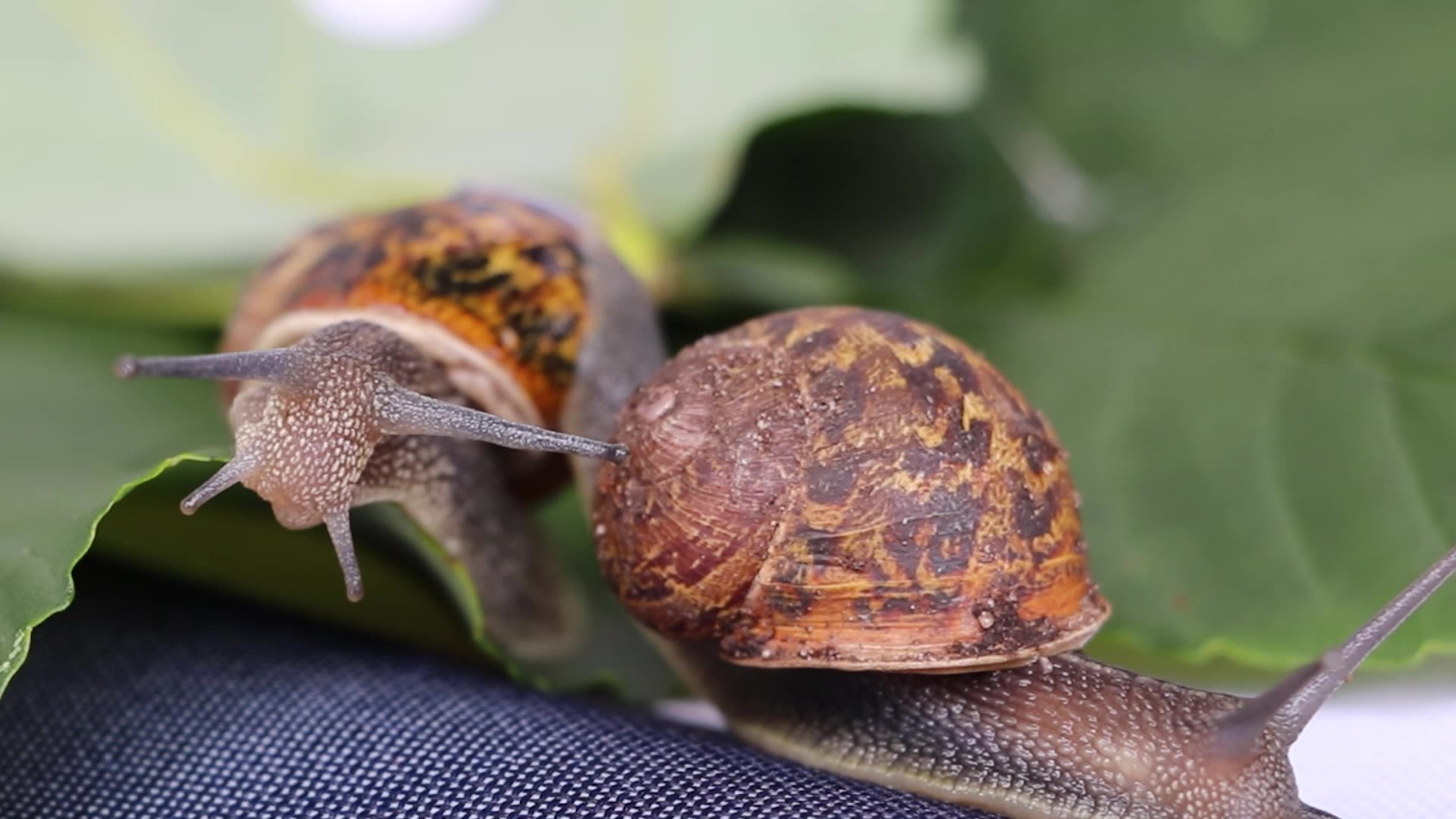
Until the 1960s, one of the major highlights of Congham was that it was 10 minutes away from the royal family’s country retreat, the Sandringham Estate. The civil parish with a population of 236 in Norfolk, England, left a mark on Britain’s wackiest events calendar following the return of a man named Tom Elwes from France – who exported the world’s slowest sport to a local village fête.
Enter the World Snail Racing Championships, an invertebrate derby with locally sourced competitors and nail-biting finishes, leaving the likes of Newmarket, Epsom and the Grand National in its slimy wake.
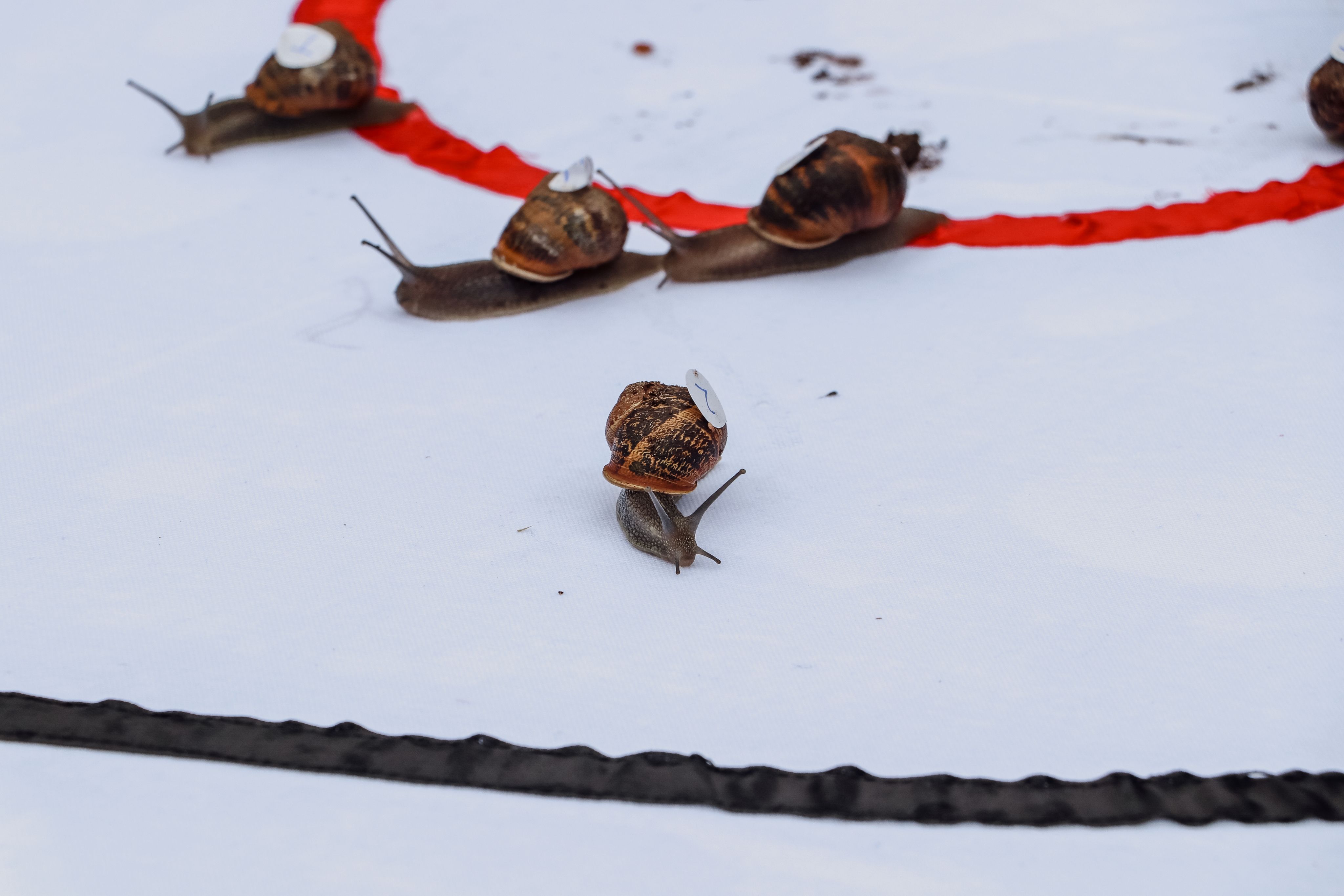
Players can't wander off course on a circular racetrack. Image by Malavika Pradeep
Players can't wander off course on a circular racetrack. Image by Malavika Pradeep
The rules and format of the competition are fairly simple. Only pedigree garden snails, or Cornu aspersum, are allowed to be registered as participants. Although the contest is BYOS (Bring Your Own Snails), trainers have the option to pick their players from the local talent pool raised by the organisers.
A trainer can enter more than 15 snails into the championships. But with the cost-of-living crisis also hitting gastropods, the entry fee is currently priced at £1 per snail.
Competitors are also encouraged to dress up, decorate their snails with pet-friendly paint and cheer for them behind risk-assessed bunting in true British fashion. The trainers are further allowed to name their snails. While children prefer DreamWorks Animation-style monikers like Turbo and Speedy, older contestants are inclined to name incompetent players after British politicians.
The tournament is divided into heats, with 10 snails in each race leading up to the grand finale. Once registered, participants are given unique identification numbers which are written on stickers and attached to their shells. They are then placed on a circular course with a 13.5-inch radius and pointed in the right direction.
The races start with ‘snail masters’ Nicholas Dickinson and Ian Haynes shouting “Ready, Set, Slow.” The first player to slime its way to the black ring lining the perimeter is declared the world champion and presented with a pewter mug along with a week’s worth of lettuce.
“We check all snails for any performance-enhancing drugs at the registration desk,” says Dickinson. “Once they’re in the arena, they’re free to race at their own speed, but we intervene if we spot any cheating.” According to the snail master, the most common form of deception features athletes hitching rides on other participants.
“We’ll separate the snails if that happens,” Dickinson says. “If they continue to cheat, we may then penalise them by kicking them out of the race but that happens very rarely.” Apart from trainers microdosing their players on high-protein iceberg lettuce before a heat, Dickinson has witnessed illegal applications from foreign gastropods – including the giant African land snail.
Having passed several “snail master exams” to obtain his licence to host the event, the expert mentions the importance of dampening the circular course with “pure Congham well water” between each heat. The move coaxes participants out of their shells and increases their speed from very slow (0.28 centimetres per second) to slow (up to 1.3 centimetres per second).
Though the 2024 world champion Jeff stole the slime-light by completing the 13.5-inch course in four minutes and three seconds, there is a specific record all professional competitors aim to beat.
“Archie the GOAT, trained by Carl Bramham, won the 1995 race in two minutes and set a Guinness record which is still undisputed,” Dickinson says. “The fastest heat in 2024 was two minutes and 50 seconds. Archie’s time just seems too good to be beaten in comparison.”
Excerpts from World Snail Racing Championships 2024. Video and editing by Malavika Pradeep
Several factors determine the performance of snails every year, as per Dickinson. “People who bring their own snails train them for weeks or months,” he says. The process is claimed to build personal bonds and give players the drive to please their owners.
Despite the molluscs lacking all sense of sound, encouraging vibrations are believed to enhance their locomotive capabilities.
“Certainly, you can over-race snails, so we have to be very careful and avoid racing them too soon after a heat. You can also overfeed them, which slows them down,” Dickinson continues. “During a race, it takes players a while to orient themselves and decide which way they want to slime to the finish line. It takes some longer than others to figure this out.”
Although the size of snails doesn’t always govern their success, weather conditions are scientifically proven to affect their motion.
“Snails prefer humid and damp environments,” Dickinson says. “But the trouble is that the conditions ideal for snail racing are not desirable for trainers and spectators. So, people like to watch the event when it’s nice, bright and sunny outside but the snails prefer racing when it’s a bit moist and cooler.”
However, the tournament has recorded up to 300 entrants in the past – with trainers travelling across the globe from Norway, Malawi and North America. “It’s a competition which captivates everyone’s imagination,” Dickinson says. “People love participating [in] and watching the race. It’s just a great fun event.”
Snail masters Nicholas Dickinson and Ian Haynes hosting the 2024 tournament. Image and audio editing by Malavika Pradeep
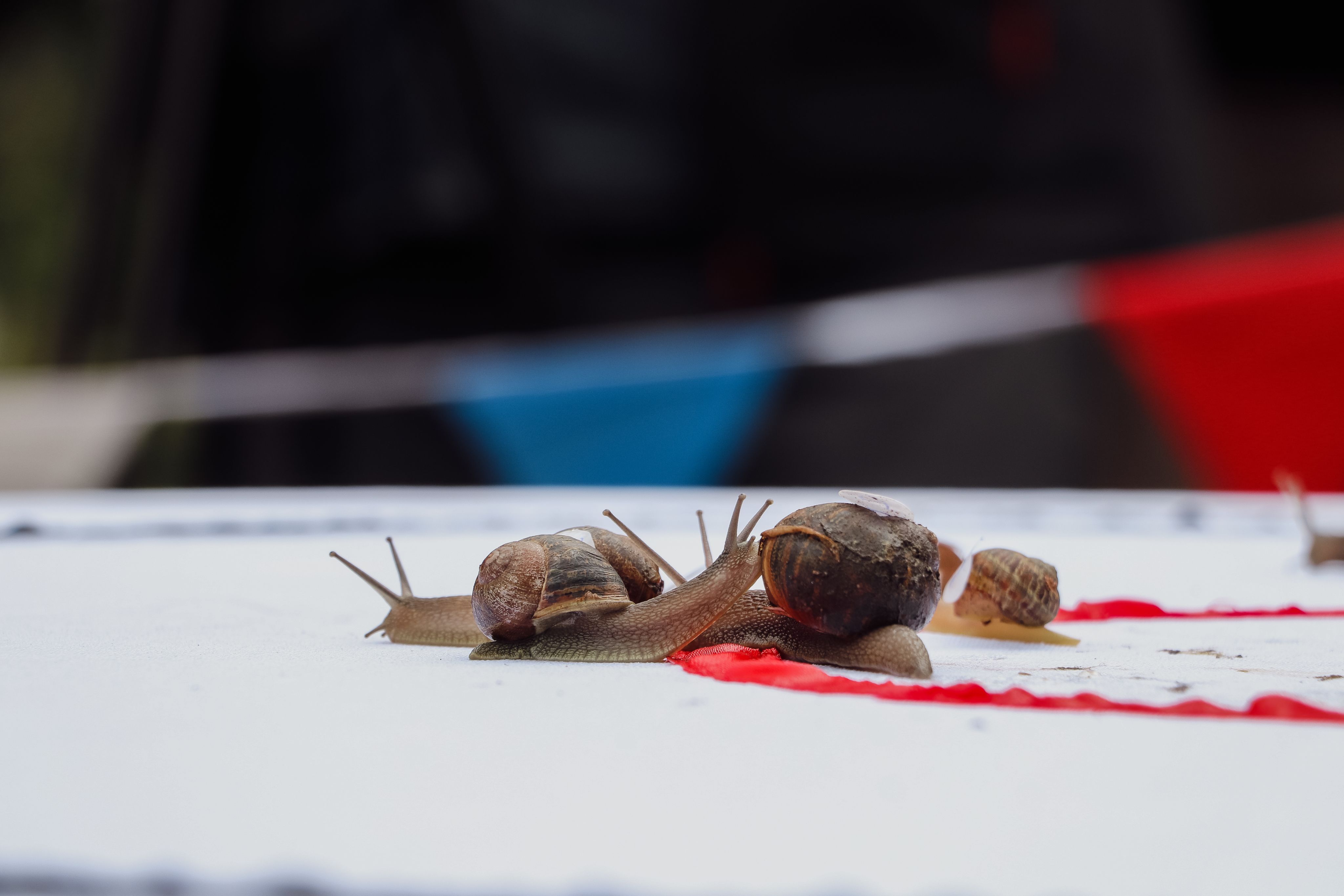
Hosting the 54th edition of the championships in 2024, Congham has undoubtedly established itself as the snail racing capital of the world – currently registering media interest from Reuters and the New York Times as part of their 2024 Paris Olympics coverage. But in the conversation about the event's history, it seems essential to address its roots in Lagardère, a village in Southwest France.
With footage showcasing the event being hosted on multiple tables with up to 20 snails in each heat, it is evident that the format has not been subjected to intense alterations in Congham. However, it is worth noting that the snails quite literally raced for their lives back in France.
Unless the losing players were given a mayoral pardon, they are reported to have been subsequently cooked with vinegar, ham, garlic and tomatoes for spectators.
As a low-lying village surrounded by ponds, alongside the promise of never eating their prized competitors, Congham is perceived as the ideal headquarters for the tournament.
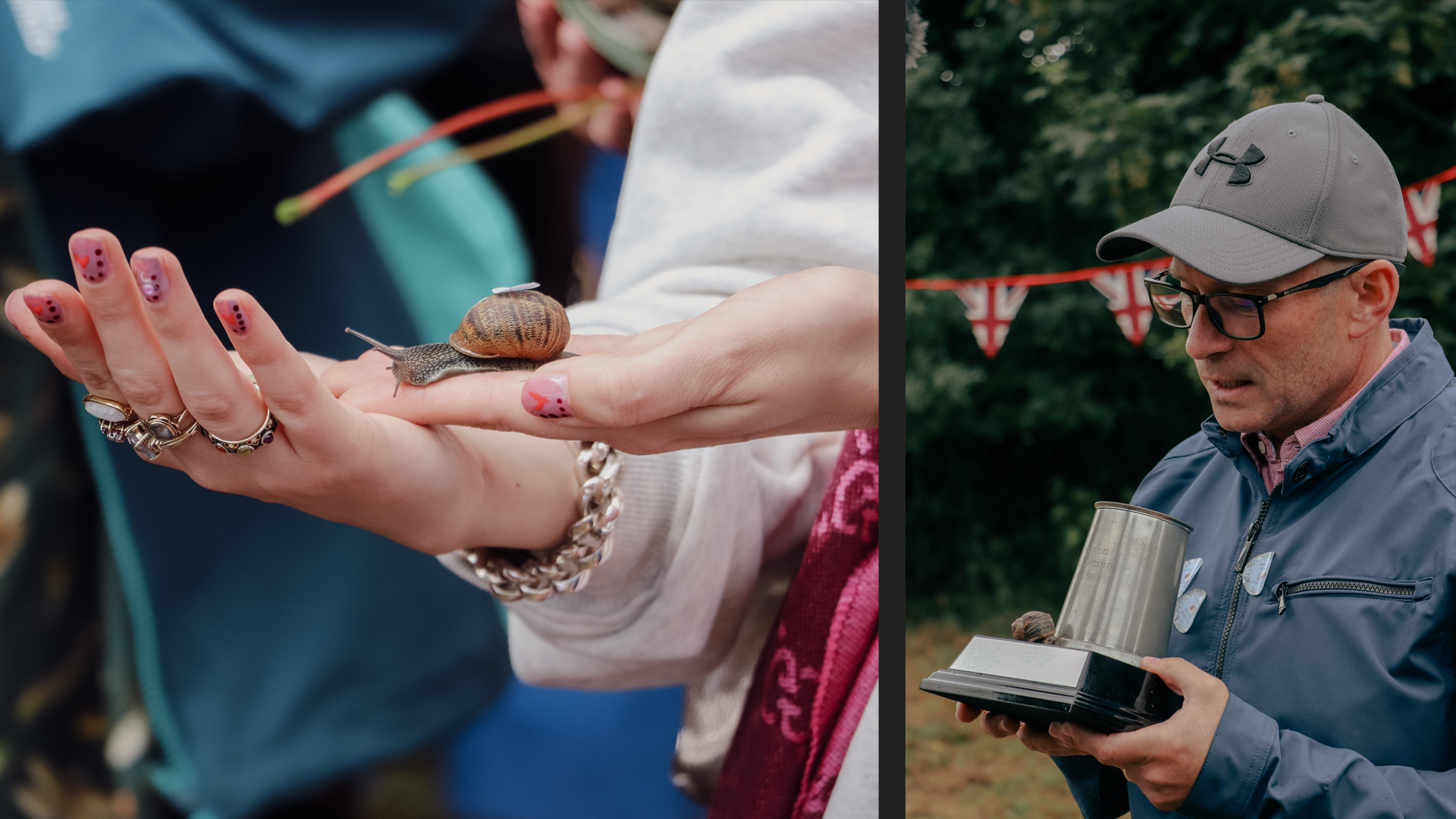
Gastro, the winner of the second heat (left) and 2024 world champion Jeff with his trainer Simon (right). Images by Malavika Pradeep
Gastro, the winner of the second heat (left) and 2024 world champion Jeff with his trainer Simon (right). Images by Malavika Pradeep
“The event became a COVID-19 casualty like so many things and 2018 was the last pre-pandemic year that the championships took place,” Dickinson recalls, adding that it was always hosted as part of the Congham village fête. “We brought it back in 2023 and attached it to a charity festival,” he continues. In 2024, the event raised a whopping £10,000 – paired with live music, food stalls and beer tents.
Dickinson also shares his optimism regarding the tournament’s future. “The competition has been held here at the grounds of Congham Hall for its entire history,” he says. “I’d like to see us getting to at least number 100 before it goes out of fashion.”
Sure, there's not much drama involved in watching gastropods go antenna to antenna on a well-watered racetrack when compared to mainstream derby. Nevertheless, it is an annual reminder for trainers, spectators and snail masters to take life one heat at a time. After all, no dream is too big and no dreamer too small.
Gloucestershire cheese rolling, Dorset nettle eating and Congham snail racing are all public tests of endurance, patience and persistence. The three events also celebrate common pests – stinging nettles in Dorset, garden snails in Congham and, well, human beings in Gloucestershire.
Although the competitions have been subjected to breaks spanning years, they have always managed to bounce back following initiatives from the local community. At some point in their history, however, there have been discussions about the culture killer of commercialisation.
In the case of cheese rolling, organisers have previously attempted to put a £20 price tag on the event and host it over an entire weekend, while nettle eating and snail racing were subjected to small entry fees.
But what differentiates commodification from attempts to manage an event’s global appeal to rule out genuine health and safety concerns? Where does one draw the line between feasibility and cultural collapse? Are participatory traditions their own ally and enemy in this sense?
“Asking for nominal fees or donations from those who can afford it is one thing, but demanding high admission charges means that some are excluded from attending for purely financial reasons, which is a pity,” says Calendar Customs author Averil Shepherd. “I know of an onion festival that’s currently in abeyance, which some have planned to carry on as part of a music event over a whole weekend with a monetary charge. There’s some local opposition to it, which I can understand.”
Meanwhile, storyteller Martin Maudsley mentions how it all boils down to motives. “Sometimes it’s alright to put a small price on it to stop it from getting too big,” he says.
“For example, the orchard where the nettle eating contest is hosted has to make a living, look after the land and provide free cider to participants. They’re managing the event with good intentions, so they need to have some way of making money back on it. Things go wrong when people do it for ill reasons rather than celebrating or supporting the local habitat.”
Shepherd further mentions how she prioritises the coverage of those traditions which are free to attend or charge modest fees on Calendar Customs. “These are run by the people for the people and the love of the tradition rather than for profit,” she says. “I think that’s a very healthy state of affairs.”
“Not everything worthwhile has to have commercial value”
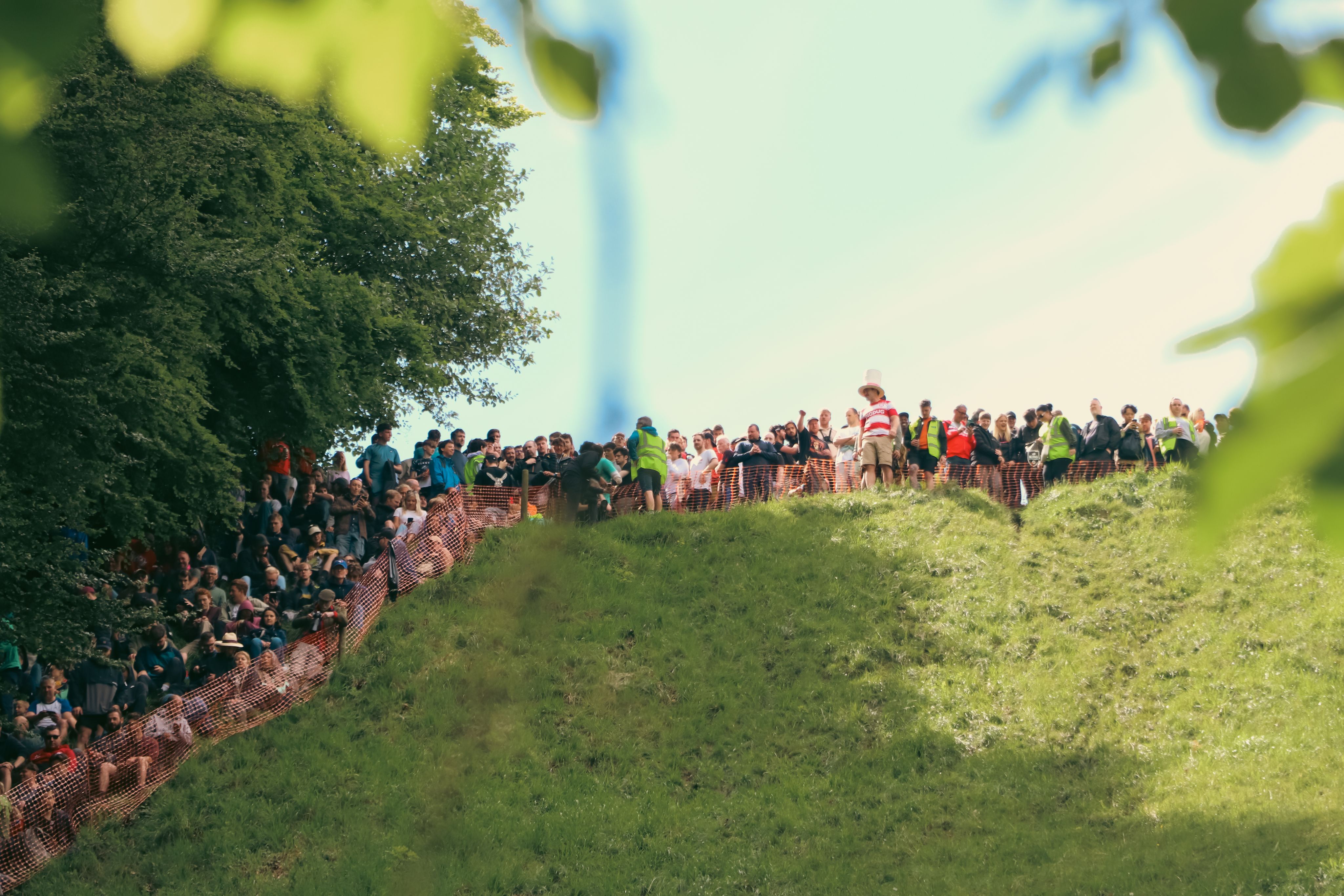
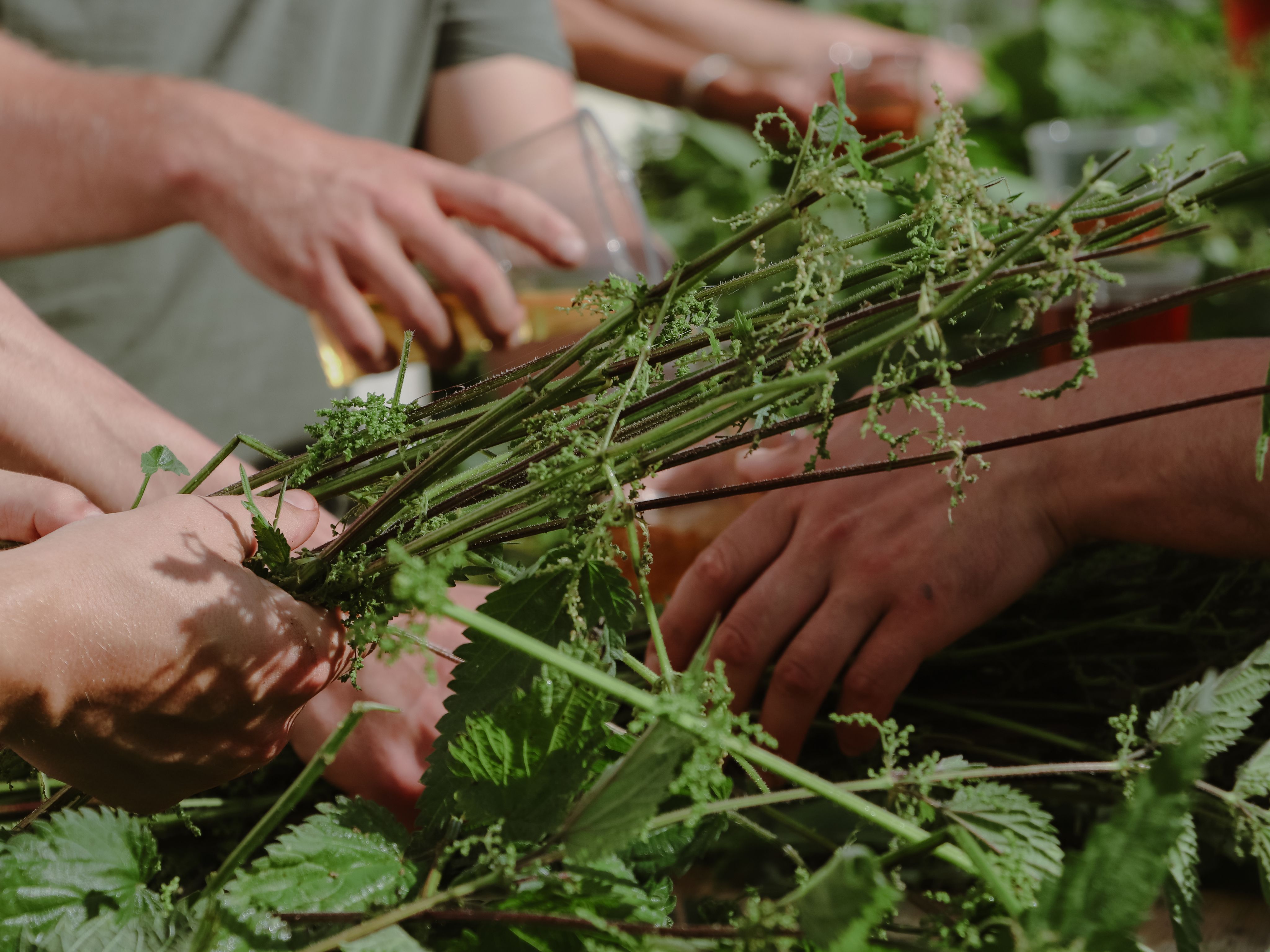
The dissection of unusual pastimes isn’t complete without addressing their broader appeal among younger generations. Although notorious for their chronic online presence, Shepherd and Maudsley share that they have witnessed a growing interest in offbeat traditions among younger audiences.
“You would think of folklore as being old fashioned or having a traditional set of ideas, but the folklore community on Twitter is huge,” Maudsley says. “A lot of it is young people trying to find out about the local legends of different countries, along with traditions and superstitions.”
The storyteller believes social media has refurbished the word-of-mouth process, which previously dictated the charm and lifespan of ancient customs. “It used to be a slower affair in the olden days,” he continues. “Young people are still spreading the word online and I think that’s great.”
“Eccentric events and costumes are perfect for creating interesting content,” Shepherd agrees. A quick YouTube search will also land you in a sea of daredevil videos by young influencers who spend months training for events like nettle eating. Popular American streamer IShowSpeed also participated in the 2024 edition of Gloucestershire cheese rolling – registering up to 2.6 million views on his video from a predominantly Gen Z audience.
The youth’s hopes of finding digital communities and fireplaces also extend to their offline pursuits, as per Shepherd. “This applies to people of any age but may be particularly appealing to those who spend much of their time working and socialising on screens,” she adds.
“I’ve observed that the crowd at many events are bigger than they used to be 15 years ago, which must be good for revenue collection. It’s also a boost for the people putting on the event and shows appreciation for their efforts.”
Over the next 10 years, Shepherd plans to attend events she has yet to cover on Calendar Customs. She also looks forward to revisiting some of her all-time favourites, including Tar Barrel carrying at Ottery St Mary and Hare Pie Scramble and Bottle Kicking at Hallaton, Leicestershire.
“There’s no substitute for actually turning up on the day to see what unfolds,” she says. “Traditions evolve over time and that’s an excellent excuse to go back to some of them to mark any changes.”
Every week, a news article or Reddit thread seems to declare the end of communal life. Villages are deemed ghost towns and the bygone era of integrated living is memorialised in travel blogs. But with younger generations weaving ancient customs back into the social fabric with a digital web, these pastimes will undoubtedly help us recollect our past and establish how to pursue the future.
So, the next time someone asks what the English like to do for fun...

